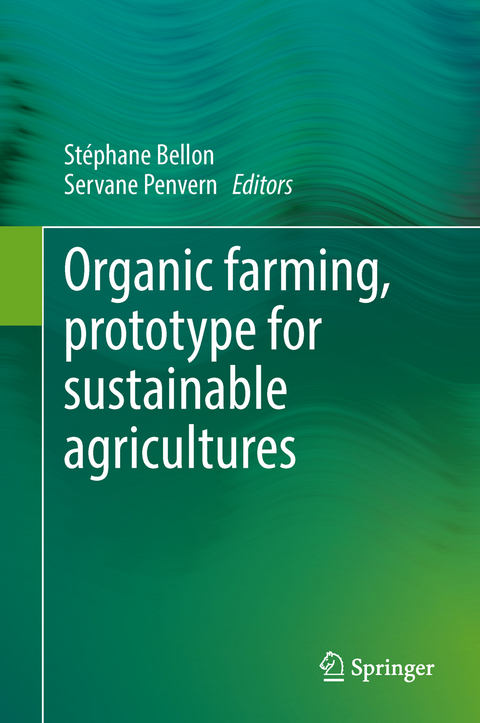
Organic Farming, Prototype for Sustainable Agricultures
Springer (Verlag)
978-94-007-7926-6 (ISBN)
Preface.- 1. Introduction: Organic food and Farming, Prototype for Sustainable Agriculture.- PART 1 – SYSTEM’S FUNCTIONING TO IMPROVE SELF-SUFFICIENCY.- 1.1 Organic Landcare and Fertility.- 2. Soil phosphorus (P) management in organic cropping systems: from current practices to avenues for a more efficient use of P resource.- 3. Intercropping – applying ecological principles for improved nitrogen use efficiency in organic farming systems.- 1.2 Crop Protection in Organic Farming.- 4. Regulatory framework for plant protection in organic farming.- 5. Conservation biocontrol: Principles and implementation in organic farming.- 6. Contribution of agroecology to plant protection in Organic Farming: Relevance and Limits.- 7. Building apple ideotypes adapted to organic and low-input, competitive systems.- 1.3 Livestock Management and System Design.- 8. Alternatives to chemical antiparasitic drugs in livestock in organic farming.- 9. Animal healthcare strategies in organic and conventional farming.- 10. Technical and economic performances in organic sheep-for-meat farms: observations on sheep-rearing networks and experimental farms.- 11. Experiencing organic mixed-crop dairy systems: a step by step assessment and redesign centred on a long-term experiment.- PART 2 – ORGANIC PERFORMANCES: BETWEEN SOCIETAL EXPECTATIONS AND SCIENTIFIC EVIDENCE.- 2.1 Environmental Issues.- 12. Using Life Cycle Analysis to compare the environmental performance of organic and conventional apple orchards.- 13. The potential of organic agriculture to mitigate the impact of agriculture on global warming - a review.- 2.2 Animal Welfare.- 14. The respect of the five freedoms of farm animal in a context of environmental and health constraints: how much organic farming may play a role? A review.- 15. Can organic animal farmers do animal husbandry? Breaking with “animal production”, a major issue for organic farming.- 2.3 Quality of OrganicProducts.- 16. Food quality and possible positive health effect of organic products.- 17. Quality of organic lamb.- 18. Is organic farming unsustainable? Analysis of the debate about the conventionalisation of the organic label.- PART 3 – DEVELOPMENT DYNAMIC AND UP-SCALING (FOOD SYSTEM AND TERRITORY).- 3.1 New Frameworks for New Valuation Criteria.- 19. Transforming Recognition of the Social, Ecological and Economic Goods and Services Derived from Organic Agriculture in the Canadian Context.- 20. Seed sector and breeding methods: challenges for organic varieties.- 21. Seed for Organic Agriculture: the Development of the Participatory Plant Breeding and the Farmers’ Networks in France.- 3.2 Transition Pathways in Agri-Food Systems: Farming Practices and Food Networks.- 22. Enabling the Ecological Redesign of Organic and Conventional Agriculture: A Social Ecology and Psychosocial Perspective – Position Paper.- 23. Transitions towards organic farming at the farm and at the local scales: the role of innovative production and organisational modes and networks.- 24. Contributing to the sustainability of agro-food systems: Potentials and pitfalls for organic farming.- 25. Multi-scale integrated assessment of regional conversion to Organic Farming.
| Erscheint lt. Verlag | 8.5.2014 |
|---|---|
| Zusatzinfo | 30 Illustrations, color; 26 Illustrations, black and white; XVI, 489 p. 56 illus., 30 illus. in color. |
| Verlagsort | Dordrecht |
| Sprache | englisch |
| Maße | 155 x 235 mm |
| Themenwelt | Naturwissenschaften ► Biologie ► Botanik |
| Naturwissenschaften ► Biologie ► Ökologie / Naturschutz | |
| Sozialwissenschaften ► Soziologie | |
| Technik | |
| Veterinärmedizin | |
| Weitere Fachgebiete ► Land- / Forstwirtschaft / Fischerei | |
| Schlagworte | Development model • Innovation • System assessment • System functioning • Transition |
| ISBN-10 | 94-007-7926-7 / 9400779267 |
| ISBN-13 | 978-94-007-7926-6 / 9789400779266 |
| Zustand | Neuware |
| Haben Sie eine Frage zum Produkt? |
aus dem Bereich


